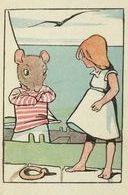“…than if she killed him.” More: Greenfield.
Archive for 2010
California county bans Happy Meals
Officials of Santa Clara County “vote to ban toys and other promotions that restaurants offer with high-calorie children’s meals.” [L.A. Times] More: Alkon (“There is a solution to this sort of thing. It’s called parents.”), Cavanaugh/Reason.
Improving one’s search engine associations
Patrick at Popehat isn’t convinced a lawsuit-prone Wisconsin woman is really helping herself out much. Earlier here and here.
CPSIA: hearing set for tomorrow on proposed legislative fix
Readers of this site will recall that as reports rolled in last year of the calamitous effects of the Consumer Product Safety Improvement Act of 2008, the Congressional leadership, and in particular key lawmaker Henry Waxman (D-Calif.) steadfastly refused to hold hearings or in general acknowledge that the law was causing systematic ill effects of any sort. As resale outlets across the nation swept harmless winter coats from their shelves or stopped dealing in kids’ goods entirely;  as librarians warned that whole collections of pre-1985 books would need to be either put through prohibitively expensive testing or simply discarded; as makers, importers and sellers of perfectly harmless apparel, school supplies, furniture, musical instruments and other children’s items puzzled over ruinously high testing costs and bans on common materials like brass; as smaller, craft-oriented producers began folding, leaving the market to be served by the largest mass-production toymakers and retailers (many of which had supported the legislation); as the kids’ motor vehicle industry, including makers and sellers of dirtbikes and mini-ATVs, found itself transformed overnight into outlaws; even as all this unfolded, Henry Waxman and his counterparts on the Senate side kept the lid clamped down tight on any Capitol Hill airing of such woes. Eventually Waxman held a hearing with exactly one (1) witness, Obama-appointed CPSC chairperson Inez Tenenbaum, who sought to put the best face on the law. (After a false start, a House small business committee lacking actual legislative jurisdiction was also allowed to hold a more varied hearing.)
as librarians warned that whole collections of pre-1985 books would need to be either put through prohibitively expensive testing or simply discarded; as makers, importers and sellers of perfectly harmless apparel, school supplies, furniture, musical instruments and other children’s items puzzled over ruinously high testing costs and bans on common materials like brass; as smaller, craft-oriented producers began folding, leaving the market to be served by the largest mass-production toymakers and retailers (many of which had supported the legislation); as the kids’ motor vehicle industry, including makers and sellers of dirtbikes and mini-ATVs, found itself transformed overnight into outlaws; even as all this unfolded, Henry Waxman and his counterparts on the Senate side kept the lid clamped down tight on any Capitol Hill airing of such woes. Eventually Waxman held a hearing with exactly one (1) witness, Obama-appointed CPSC chairperson Inez Tenenbaum, who sought to put the best face on the law. (After a false start, a House small business committee lacking actual legislative jurisdiction was also allowed to hold a more varied hearing.)
In recent months, without of course admitting any error whatsoever, representatives of Waxman’s office have been quietly floating amendments intended to correct some of CPSIA’s most blatantly impractical elements. The fixes would be likely to help in some specific areas where opposition has been vocal and influential,  such as children’s books and mini-vehicles, while affording much less relief, or none at all, to many others trying to cope with the law. At the same time, Waxman’s staff has been demanding that “business” (conceived as if it were some monolithic group) gratefully sign off on the fix as acceptable and perhaps even accept new provisions that would increase CPSIA burdens. While many affected groups are understandably eager to reach a deal, others, such as persistent critic and businessman-blogger Rick Woldenberg, are reluctant to sign off on obviously partial and inadequate fixes as if were going to solve the wider problems with the law.
such as children’s books and mini-vehicles, while affording much less relief, or none at all, to many others trying to cope with the law. At the same time, Waxman’s staff has been demanding that “business” (conceived as if it were some monolithic group) gratefully sign off on the fix as acceptable and perhaps even accept new provisions that would increase CPSIA burdens. While many affected groups are understandably eager to reach a deal, others, such as persistent critic and businessman-blogger Rick Woldenberg, are reluctant to sign off on obviously partial and inadequate fixes as if were going to solve the wider problems with the law.
The fixer amendment has gone through several iterations; its current draft is here (PDF), named the Consumer Product Safety Enhancement Act of 2010, or CPSEA (more background from the committee, PDF, via ShopFloor). Now, at long last, Waxman has agreed to hold a hearing tomorrow (to be chaired by his colleague Rep. Bobby Rush, D-Ill.). The witness list includes persons from Goodwill Industries, the National Association of Manufacturers, Handmade Toy Alliance, and the Motorcycle Industry Council — all of which groups have apparently agreed to support the legislation — as well as Rick Woldenberg of Learning Resources Inc., who continues as a critic, and Steve Levy of the American Apparel and Footwear Association. Of course the difference now, and the reason some of these groups at long last will get their chance to testify, is that they have agreed to testify at least nominally on Waxman’s and Rush’s side — perhaps in some cases while biting their tongues.
We’ll be reporting more in days to come. In the mean time, this would make a good occasion for news organizations to renew their attention to the public policy disaster that CPSIA has wrought.
PUBLIC DOMAIN IMAGES from Honor C. Appleton, The Bad Mrs. Ginger (Frederick A. Stokes Co., 1902), courtesy ChildrensLibrary.org.
Draft a slip-fall complaint in 9 easy steps
More fun from The Namby Pamby (language). More: Legal Blog Watch (“slip and fall complaint Mad Libs”).
Criminal libel charge over academic book review, cont’d
More on the Karin Calvo-Goller/Joseph Weiler criminal libel case in France, in a Chronicle of Higher Education link that will remain free only briefly. Earlier here.
CCAF files Bluetooth appeal brief
Ted’s Center for Class Action Fairness has been contesting a class action settlement as overly generous toward lawyers’ interests. The underlying lawsuit claims failure to warn of hearing loss from high-volume headset use. [CCAF, Bader/Open Market] More: California Civil Justice, Aetherczar.
Jerman v. Carlisle
Reader John B. alerts us: “If you haven’t already seen it, there’s excellent Overlawyered-type rhetoric from Justice Kennedy in Monday’s Supreme Court opinion on debt collectors’ liability under federal statutory law. Unfortunately it’s in the dissent (PDF).”
Wrote Kennedy:
[The Court’s decision today] aligns the judicial system with those who would use litigation to enrich themselves at the expense of attorneys who strictly follow and adhere to professional and ethical standards.
When the law is used to punish good-faith mistakes; when adopting reasonable safeguards is not enough to avoid liability; when the costs of discovery and litigation are used to force settlement even absent fault or injury; when class-action suits transform technical legal violations into windfalls for plaintiffs or their attorneys, the Court, by failing to adopt a reasonable interpretation to counter these excesses, risks compromising its own institutional responsibility to ensure a workable and just litigation system.
Supreme Court to consider violent-videogame law
Ann Althouse wisecracks: “Who could have imagined that one day the Supreme Court would take a case called Schwarzenegger… and Schwarzenegger would be arguing for preventing young people from viewing graphic depictions of violence? That day has come.” More: Sullum, SCOTUSblog.
“Collaboration not Litigation Ale”
Two craft brewers “found themselves on the brink of a product name dispute. Rather than calling in the lawyers, however, they drew upon their brewing talents to concoct a unique solution.” [95 Years]
